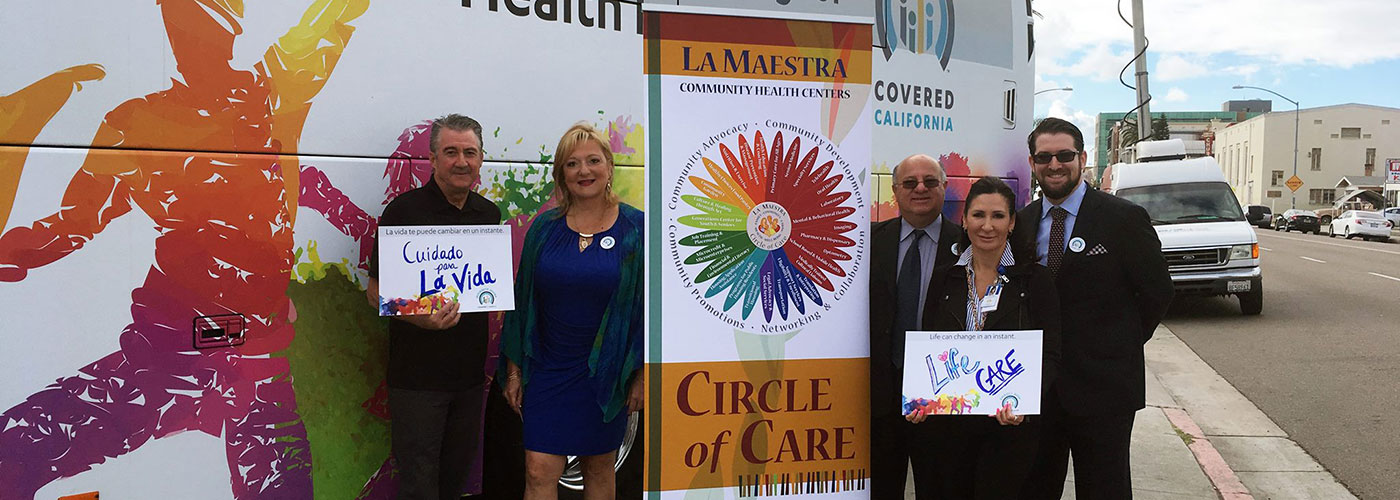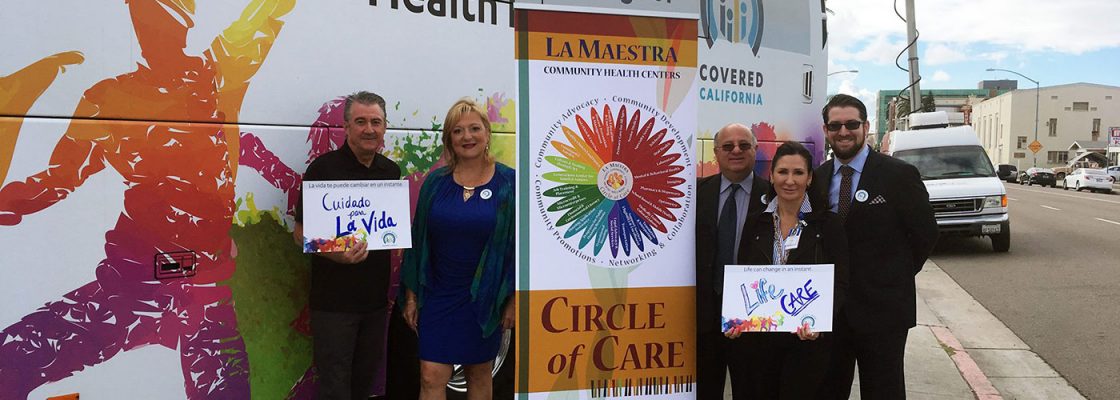We are coming to understand that to keep people healthy, we need to address factors that used to be outside the purview of the exam room—social determinants like housing and access to food. This means integrating medical care with social services and taking on projects that help patients solve problems that can stymie effective healthcare. La Maestra Community Health Centers in San Diego have pursued an ambitious integration model for meeting all the needs of their vulnerable patient population. They call this approach the “Circle of Care.”

Starting from a Different Place
Unlike many safety net organizations, La Maestra did not start in the health sector. In 1986, La Maestra Amnesty Center was founded offering English as a Second Language classes, vocational training and legal help for immigrants. Focused on family literacy, immigrant parents came in to learn English for the workplace while their children took classes to get them ready for American schools. Their legal advisors assisted thousands in navigating the legalization process to become permanent residents. Along with immigrant families, La Maestra worked with refugees, human trafficking victims, veterans, those recently released from prison and others who needed help finding a place in mainstream society.
When Patients Ask for a Clinic
However the vulnerable people that La Maestra worked with needed more than just education. The organization’s health center was founded in 1990 after the council representing the center’s 12,000 students recognized the need for a culturally and linguistically competent local provider that would offer care despite a lack of insurance. The La Maestra Family Clinic quickly grew to take over 14 residential buildings to keep up with patient demand. They became an FQHC and added a number of satellite locations throughout San Diego, including four school-based health centers. In 2010 they built a 36,000 square foot health center that sees over 200,000 patient visits each year.
A Nexus for Meeting All Needs
But a clinic wasn’t the only institution La Maestra realized it’s students needed. Beyond health and education, they needed help finding jobs, safety from domestic violence, housing, and fresh food. Over the last twenty-five years they have grown to add a community garden where families could rent plots, a food pantry, a “Generations” center providing activities for both children and seniors, a number of safe transitional housing units, facilities offering legal help, microcredit loans for women entreprenuers, financial literacy education, benefit enrollment, substance abuse recovery support, and other social services. They even have a microenterprise program that runs several small businesses to provide jobs and vocational training to clients—a flower shop, a print shop, a linens cleaning business—that serve other La Maestra programs and the local community. All of these programs and facilities are located near each other, close to La Maestra’s main health center, many in the 14 buildings that originally comprised the family clinic. This creates a nexus where vulnerable people can go to get many of their needs met in one trip.
A Philosophy of Outreach and Expansion
La Maestra decides where to put its efforts based on a constant campaign of outreach to the community it serves. Dedicated liaisons go to community meetings, meet with student groups and others to determine what are the most pressing needs and the low hanging fruit. Then La Maestra looks to see if other organizations are providing those needed services and try to connect and partner with them. If not, they will move to build the service themselves.
To build these new services, La Maestra takes an aggressive stance towards pursuing real estate opportunities and funding sources that many FQHCs would consider outside their scope. The key is not to limit opportunities by applying only for healthcare grants or looking only at convenient properties that are suitable for clinical work. Further, the health center side of La Maestra puts a portion of its operational budget towards funding the other parts of the Circle of Care.
How to Train for Integration
- For many clinics pursuing better integration, even knowing who to contact among local social service organizations can be a challenge. More mature clinics may have a social worker on staff to handle such questions.
- At La Maestra, connecting patients with their larger network of social services is made the responsibility and priority of every employee. Workers are cross-trained to be culturally competent salespeople for La Maestra’s other services.
- New employees are given an orientation on the whole scope of the organization’s services, including presentations by employees from a variety of other programs explaining what they do and how they work.
- Each employee has a graphic chart on their desk with contact information for all La Maestra’s programs.
- When a client comes in to one program, the provider or staff member they see will ask them about their other needs. “Are you getting enough to eat? Do you have legal troubles? Is your housing safe?” They will make sure clients know about all the programs available to them.
- Leadership, up to the top of the organization, makes it a priority to keep staff focused on constant integration with the entire organization. “I reinforce this with them a lot,” said CEO Zara Marselian.
- La Maestra also makes cultural competency a core part of all their services. They have employees from 28 culturally diverse populations. That skill of determining and tackling clients’ needs in a culturally competent way forms a base that unites all their programs.
What’s Next?
La Maestra is looking at building another large health center site in another part of the San Diego area, which will also include family housing, a community garden, and facilities to house the organization’s other services—a second nexus. Marselian also has ambitions to create a network-wide EHR-style database that can track clients across all of La Maestra’s programs, with staff checking off a range of wellness needs with each encounter. In the meantime La Maestra consults with other FQHCs on adopting the Circle of Care model and often visits Washington D.C. to advocate for vulnerable patients and for funding a more integrated model of care.
Learn More
La Maestra Community Health Center has sites across the San Diego Area. lamaestra.org
Find this useful or interesting? We’re constantly sharing stuff like this. Sign up to receive our newsletter to stay in the loop.


